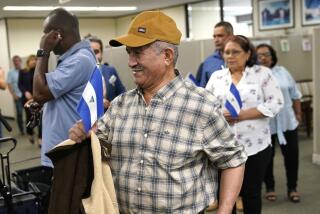Nicaragua’s Sumus--a Pitiful Example of People Living as Pawns
- Share via
One of the little-noticed points of the Central American peace plan is a call on the governments there to “give urgent attention” to the needs of their nations’ refugees and displaced--to protect them and help especially those who want to return to their homes. Perhaps the group most desperately in need of such attention is Nicaragua’s Sumu Indian nation.
The Sumus are a small people, probably numbering fewer than 10,000. They have suffered so severely the ravages of the war in Nicaragua that their survival as a people is threatened. Despite their determined efforts to remain neutral, the Sumus have been victimized--first by the Sandinistas and then by the Contras. It seems that both have found the Sumus’ refusal to take sides suspicious.
In July, 1982, Sandinista troops occupied the Sumus’ principal community, Musuwas, capturing 32 young Sumus--apparently for the draft. Feeling that their homes were no longer safe, the Sumus fled--nearly 2,000 seeking refuge in Honduras, others hiding in the mountains in Nicaragua. Most who did not flee were resettled forcibly by the Sandinistas.
While the Sumus had hoped to find safety in Honduras, they found nothing but trouble. Settled in a refugee camp within walking distance of a Contra base, they were forced--under threat--to join the Contras’ ranks. Once inducted, the Sumus were treated as indispensable. Contra commanders assigned them the most dangerous tasks. When the enemy was encountered, the Sumus were the first to fall.
Sumu fighters who tried to escape the Contra ranks, and refugee families that sought to relocate to a more secure area, were threatened with death. While Sumu men were dying in the war, birthrates in the refugee camps dropped off. Destitute and afraid, the Sumus began to speak openly of their possible extinction.
By 1985 disillusioned Sumus began trickling back to Nicaragua, hoping that they could somehow rebuild their lives there. Today, returning home seems to be their foremost desire.
About half the Sumus who sought refuge in Honduras have returned to Nicaragua. But returning home has not been a dream come true. Although the Sandinista government has eagerly encouraged repatriation, it has not provided the minimal aid needed to help the Sumus rebuild.A visit to areas being resettled in Bonanza and Rosita found serious shortages of food, housing and medicines. Conditions are tolerable only in areas targeted by international relief organizations. Nonetheless, the Sandinistas are to be commended for having made good (with some exceptions) a promise to stop drafting the Sumus. Meanwhile, continued fighting in the area has prevented the Sumus from returning to live in their traditional villages. Many travel by day to tend their plots, returning at night to secure areas to sleep.
But the most serious threat to the recovery of the Sumus comes from Contra units that have used intimidation, kidnaping and murder to prevent them from resuming their lives in Nicaragua. While the Sandinista government sees the return of refugees as a victory for its revolution, the Contras see it as a repudiation of their cause. In addition, they fear the loss of the reservoir of young Sumus to recruit.
In the spirit of the Central America peace plan, both the insurgents and the government forces should respect the Sumus’ neutrality and allow them to get on with the vital task of resettling and rebuilding their communities. The U.S. government should demand that any Contra group that it funds respect the basic human rights of the Sumu people.
More to Read
Sign up for Essential California
The most important California stories and recommendations in your inbox every morning.
You may occasionally receive promotional content from the Los Angeles Times.













